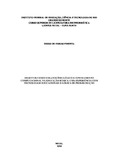Desenvolvendo o raciocínio lógico e o pensamento computacional na educação básica: uma experiência com tecnologias educacionais e lógica de programação

Visualizar/
Data
2019-12-13Autor
Pimenta, Diogo de Farias
http://lattes.cnpq.br/8983481680991978
Metadado
Mostrar registro completoResumo
Considering that logic is present daily in people's personal and professional lives and in the way computer systems work, it was decided to develop an extension project allied to a set of pedagogical practices that aimed to enable primary school students from a municipal school in the Northern Zone of Natal/RN to explore and learn concepts of Logic and Programming, through a playful teaching methodology. Thus, this work of course completion aims to report the experiences experienced and acquired with the implementation of the project mentioned to contribute to discussions and reflections on the importance of teaching programming in Basic Education and the development of logical reasoning and Computational Thinking, through educational technologies. The activities applied in the project, whose course offered was developed with a workload of 30 hours, were planned and developed by three undergraduates in Informatics with children from 10 to 13 years of age, aiming the use and exercise of logical reasoning through observation, perception and logic in various problems and challenges. In addition, the concept of Unplugged Computing favored the learning and understanding of children regarding the functioning of the computer, and the teaching of programming reinforced the content taught, presenting logic as a resource facilitator for the resolution of problems in any area of knowledge. The learning through the challenges proposed showed that a playful methodology arouses greater interest in students for the content, enabling the development of new skills that will be useful to them in the various curriculum subjects. The introduction of notions of algorithms and programming brought children closer to the area of Computing and the development of their technologies, thus what was unknown became part of the knowledge of each one of them. For the undergraduates the experience was of great importance for their teacher training, because it became an excellent opportunity to unite theory and practice, as well as acquire new knowledge. In the end, the potential and importance of technologies in human development is perceived, as they contribute with their ability to reason and perform tasks.



